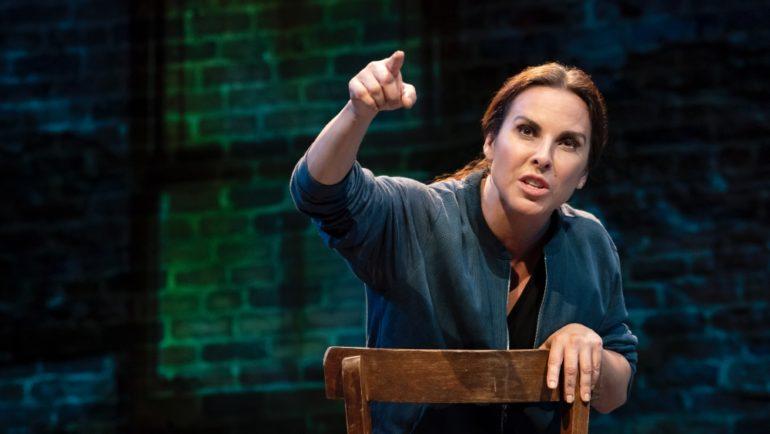Off Broadway Review: ‘The Way She Spoke’ With Kate del Castillo
By Nicole Serratore
LOS ANGELES (Variety.com) – Since the 1990s, scores of women in Juarez, Mexico have been mutilated, raped, and murdered at such a rate that some have called it an epidemic of femicide—killing women and girls solely because they are women. Isaac Gomez’s play “the way she spoke,” produced Off Broadway by Audible and starring Kate del Castillo, confronts the subject head-on with a story about a playwright who goes to Juarez to understand what has happened there.
But despite its important, difficult subject matter and its attempts to draw broader parallels to the treatment of women the world over, the work suffers from an odd detachment. The story’s emotional core is short-circuited by the play’s structure and the production’s approach. Foregrounded but enervating theatricality rests uneasily against the documentary elements, and the voices of the real people who have suffered get lost in the dramatizing.
Led by Mexican film and television star del Castillo, the play is framed around an unnamed actress helping an unseen playwright friend with a reading of his play—what he calls a “docu-mythologia” about “las desaparecidas” of Juarez.
Del Castillo’s character enters fresh off a frustrating audition for yet another stereotypical role for a Latinx woman. She picks up the script to read it aloud, discovering its subject as she goes, breaking character at times to converse with the silent playwright and convey her horror and astonishment at what he’s written about.
Turning back to the text — which is performed in a mix of English, Spanish and Spanglish — she portrays an array of characters, from shell-shocked mothers to anguished bystanders to violent monsters, often in monologues. But her primary job is to play the narrating playwright on this trip as he interviews the people he meets (based on interviews Gomez conducted in real life).
With slight costume adjustments throughout — kicking off her heels, putting her hair into a ponytail — del Castillo dons characters including a butch bus driver, a childhood friend of the playwright’s, and the slouching playwright himself. Her characterizations are clear, but they’re not always lived-in: One scene, in which she plays a grieving father raging against the apathy of government officials, exclusively in Spanish, brings out something deeper in her. But more often she’s wearing the external trappings of her subjects, not touching their internal lives.
One of the play’s more successful moments comes when the playwright and his local guide, Blanca, go into a corner store and show us first-hand what life in Juarez looks like for women. There Blanca demonstrates for her friend how men prey on women alone. Del Castillo plays all the parts in this chilling scenario — macho gun-toting predators and Blanca shrinking into her own skin — with precision.
But in general, the production elements come off as both dull and distracting. The static production, directed by Jo Bonney, uses abrupt, obvious lighting cues to switch between scenes in Juarez and “the stage” where the actress speaks as herself. There are literal silhouette-style projections on a brick wall which give us wisps of a setting — trees, barbed wire, crosses. Often, they overemphasize what we have already been told.
The production bears the thick air of the performative. Honest emotion is lost behind enacted sentiment. The actress’s questions to the playwright kick us out of the story, reminding us we are in a theater and these events are happening elsewhere.
While the people of Juarez are audibly there on stage, they remain shrouded in all this theatricality. Rather than fade into the background, Gomez pulls our focus with his authorial presence and frequent narration. One wishes he’d leave his journey on the sidelines so that the other voices could come forward without interference.
The fact that the world has collectively ignored and looked away from this tidal wave of violence should fill us with rage and fury. The play wants us to see, hear, and feel it. A lot of personal tribulations and horrific, graphic details are shared. But despite the painful, vital, difficult topic, this telling of the story keeps us at arm’s length and allows us far too many escapes. We should not be able to forget what’s happened, and yet it passes too easily before us.

